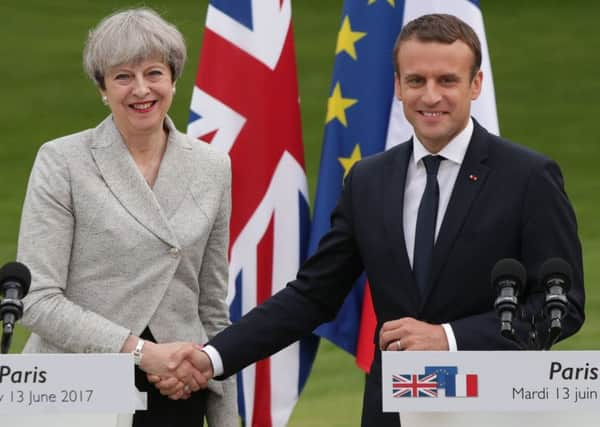Chris Haskins: MPs must now get vote on second Brexit referendum


Hitherto the Prime Minister has sought to minimise the influence the House of Commons might have on the Brexit negotiations. She sought to deny MPs the right to debate the triggering of Article 50, which would set the process in motion. But she was challenged in the High Court – and lost.
She called a snap election with two objectives in mind. Leading the polls by 24 points over Labour, she sought to wipe the Opposition off the map for the forseable future. And, in so doing, she hoped to gain such a large Conservative majority that she could railroad any Brexit settlement through Parliament.
She has failed to achieve both objectives.
Advertisement
Hide AdAdvertisement
Hide AdRather than reading the last rites over a moribund Labour Party, she has revitalised it, and it is the Conservatives who are now in turmoil. Furthermore, instead of a Conservative majority rubber-stamping her Brexit deal, the Houses of Parliament will now scrutinise in detail all proposals before either approval or rejection.
Parliament, therefore, will play a more influential part in the forthcoming negotiations and will be held accountable for the outcome of the most important economic and political debate since the end of the war.
MPs will be aware that a great deal has happened since the referendum vote. For a start, the claims made by the Leave campaign, led by Boris Johnson and Michael Gove, that Brexit would bring big economic benefits have proved to be entirely fallacious.
On the contrary, it is generally accepted that the economy will be damaged quite severely. It is already happening. This week’s figures show inflation is rising much more quickly than wages, a result of the Brexit-inspired currency devaluation. The relative calm of the past few months is over.
Advertisement
Hide AdAdvertisement
Hide AdIt becomes increasingly obvious, therefore, that the economy will suffer if the hard line Brexiteers have their way.
Now senior Conservatives, including the Chancellor Philip Hammond, are suggesting that economic agreements should determine should determine the UK’s negotiating stance, and that the hazy illusion of greater sovereignty and taking back control should not be the decisive factor. Very few of those who voted to leave thought they were also voting to be poorer.
Next the process of withdrawal is proving to be far more complicated than anyone, including the chief negotiator, David Davis, anticipated. If new trade agreements are made with the EU and the rest of the world, they will take years to put in place, assuming they can be carried out in an orderly way.
But if the Government sticks to its manifesto preconditions – no Single Market, no Customs Union, no European Court of Justice and a massive reduction in EU immigration – the result will be administrative chaos and confusion.
Advertisement
Hide AdAdvertisement
Hide AdFar from there being a bonfire of regulations, as the Leave campaign suggested, there is going to be an upsurge in bureaucracy around new trade deals and the introduction of a Customs Union.
The two main political parties mechanically and vacuously repeat the slogan that Brexit means Brexit and that the United Kingdom must leave the Single Market. They are like the citizens of Denmark who refused to admit their king was going past without any clothes on. King Brexit is similarly naked.
Common sense therefore would suggest that it is time to take stock of the situation before stumbling further into the abyss. The Government should, therefore, give MPs a free vote as to whether to hold a second referendum.
If the House of Commons said no, then the buck stops firmly with Parliament. If a referendum is called, and the people voted to remain, then that would clearly instruct the Parliament not to do a Brexit deal.
Advertisement
Hide AdAdvertisement
Hide AdIt is possible however, on further consideration of the new evidence and changing circumstances outlined above, that the voters on second thoughts will change their minds, as they do about general elections. In which case, Parliament would resume normal service with the EU. The business community, the NHS, the universities, the farmers and even the local authorities would all breathe a sigh of relief, because they would have escaped from a perilous future.
However it seems very unlikely that the two main political parties would have the courage and the common sense to endorse this approach, because they are fearful of the anti-immigrant feeling in the country which determined the referendum last year, even though most of the concerns were shamefully related to prejudice against coloured immigrants, which has nothing to do with EU membership. The naked King marches on.
Lord Haskins of Skidby is a former chairman of Northern Foods, peer and East Yorkshire farmer. He is chairman of Humber LEP. He is writing in a personal capacity.